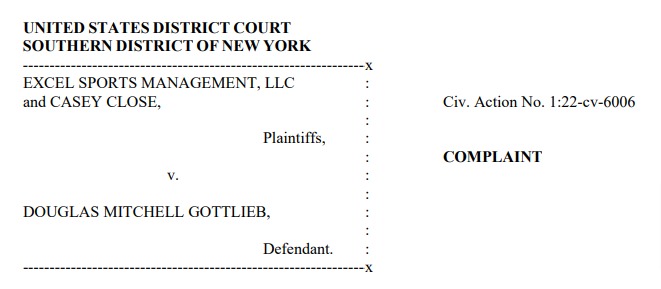You had to have seen it coming. On June 29, sports commentator Doug Gottlieb published a tweet that said, “Casey Close never told Freddie Freeman about the Braves final offer, that is why Freeman fired him. He found out in Atlanta this weekend. It isn’t that rare to have happen in MLB, but it happened – Close knew Freddie would have taken the ATL deal.” It resulted in a lot of chatter on social media and numerous articles, including one here at Sports Agent Blog.
Excel Sports Management, the company that Close is a part of, and Close himself, quickly came out with statements denying the accuracy of Gottlieb’s tweet. Excel Sports, in particular, highlighted that litigation was likely when it said, “we are immediately evaluating all legal options to address the reckless publication of inaccurate information.”
On July 14, Excel Sports and Close lodged a lawsuit against Gottlieb in the U.S. District Court for the Southern District of New York, claiming that Gottlieb is guilty of libel and that his commentary has caused reputational harm to both Plaintiffs.
While the Complaint admits that Close has been a baseball agent for more than twenty-five years, it is very careful to not overly promote Close and his accomplishments. That is likely because the Complaint purposefully notes that (at least the Plaintiffs proffer) Close is not a public figure.
The reason for taking that position is that, if Close is deemed a public figure, he then must prove that Gottlieb had actual malice when he published the tweet. It will be a question of law for the court to decide whether to accept Close’s position on that matter, and it is quite an important issue. If the court decides that Close is a public figure, then he will be required to at least sufficiently plead that Gottlieb knew his commentary was false or that he had reckless disregard for the truth.
The standard itself, when applied, can be quite complex. Courts have held that the barometer is whether the defendant, instead of acting in good faith, actually entertained serious doubts as to the truthfulness of the published account or that the defendant was highly aware that it was probably false. If Gottlieb relied on information from a strong source or multiple sources, then the Plaintiffs would probably have a hard time proving this.
Additionally, a failure to investigate, standing on its own, typically does not rise to the level of actual malice. Instead, there usually must be some showing that the defendant purposefully avoided further investigation with an intent to avoid the truth.
